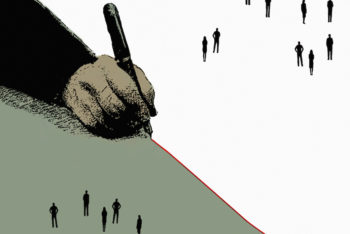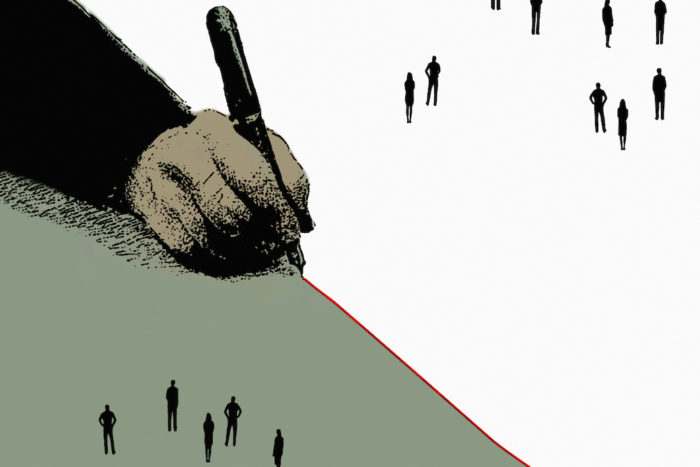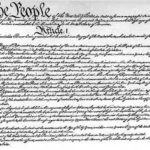Let’s Talk About Race and Racism: Structual Inequalities
Reader of this series, if you’ve been following from the beginning I hope you are able to perceive the tensions that make this topic difficult. On the one hand, a certain set of critics have accused me of “whitewashing” events to deny actual racism. On the other hand, I’ve had other critics rip into me in the comments section of social media sites where this has been posted for “falsely” characterizing the US Constitution as having an almost-hidden racial element (in part four of this series) and have been accused of pandering to liberals and have been called “antinomian.” The path to truth does not include pandering to either the die-hard defenders of America or those who believe the term “structural white supremacy” is essentially fair and not exaggerated in any way. The task of explaining what I believe are the lingering effects of past legalized racism requires building the case carefully, step by step. Today is the moment to talk about what I’m calling “structural inequality.”
The use of the term is in fact my take on something Critical Race Theory says, but those of you who are socially conservative, please don’t roll your eyes and turn away from this article because I am admitting I examined the claims of CRT and while I find I disagree in many essential points, yet I do not find all things Critical Race Theorists say totally incorrect. Again, please don’t walk away because I said that. I am not a “libtard” and am not in general an apologist for the Left. Nor am I turning Left that I can see. Hear out the case I’m making here, please.
By the way, this post is on a site dedicated to speculative fiction and someone may rightly ask how I can justify being so off-topic for the site. To which I would say this topic can be thought of as an exercise in world-building. Perhaps, after reading about structual inequality, authors may be inspired to create fictional societies in which this type of inquality is highlighted. Or non-existent. Or presented with a unique twist based on aliens or fantasy races (more on this at the end).
“Structural Racism” Versus “Structural Inequality”
Critical Race Theory talks about “structural racism” or more recently “structural white supremacy” as a means to describe society is supposedly structured in a way to promote the success of white people. Derrick Bell, one of the founders of CRT, especially believed the legal system is structured in favor of white people. This is a point where I generally disagree, because to pick out just one example, while I can agree that black jurors have historically been treated with less respect that white jurors, which has been a genuine problem stemming from racism, that does not mean that the system of trial by jury itself is designed either deliberately or accidentally for the purpose of favoring white people.
While I disagree with the broad characterization that the entire American justice system is intertwined with racism, I do agree certain particular laws have had elements that wound up having an unequal racial element, whether deliberate or not. For example, cocaine started being sold in a new crystalized form in the 1980s known as “crack,” a form of consuming cocaine that was especially popular in poor areas in inner cities, often in black neighborhoods. Lawmakers passed hard laws reacting to the wave of rising crack addition and wound up punishing crack possession much more harshly than regular cocaine often favored by wealthy, mostly white addicts. But if we could get in a time machine and ask people passing such laws why they did so in that time period, they probably would say they were trying to protect black communities rather than trying to hypocritcally imprison blacks while giving white cocaine addicts the proverbial slap on the wrist.
But the intent doesn’t matter as much as the effect–the same substance, cocaine, was treated inequally in a manner with a racial element. In this particular case, the law was in fact unequal. However, I would say the vast majority of US laws are not unequal in ways that impact people according to race, as per the claims of “structural racism.”
Generally people seeking to prove the widespread existence of structural racism pull out statistics that show differing outcomes according to race. That the loosely-used term “persons of color” (or POCs) are more likely to live in povery, drop out of school, receive stiff penalties for crimes, be in federal lockup, etc.
It’s important that I say “loosely-used” term POC because there’s some “no true Scotsman” logic applied to who is considered a POC. Asians are the wealthiest ethnic group in America per person, significantly wealthier than white Americans on average, South Asians in particular. So when talking poverty, Asians are not included in the category of POC. However, when talking historic racism, they are included. Sometimes they are also included in the discussion of income inequality, which is the focus of a CNN article I’m linking here. But in short, the Critical Race Theorists are not honestly answering the question of why it is Asians can succeed so well if the United States is a nation with a structural bias in favor of white people and white people alone.
However, let’s not let the general success of Asian Americans get our eyes off my point here. Does the United States have what I am calling “structural inequality”? That is, are there laws and practices of our nation that we all can plainly observe which have the effect of making it difficult for people in poverty to get out of poverty? Yes, there are some.
“Structural Inequality”–Examples of Laws or Practices That Impact the Poor Differently than the Rich
Fines:
A general example of a law with unequal impact is any fine in a fixed dollar amount. For example, a fine of five hundred dollars for burning leaves without a permit (a fine I’ve received) can be devastating if you are poor. You might have to take out a loan to pay it–though if you are unwilling to take out a loan, you might try skipping your date in court and hope the system forgets about you. In fact, the legal system does have other priorities and you will be ignored for your fine–unless you are stopped by the police for something else, in which case your failure to show up in court will have been converted to a warrant for your arrest. You may be given an opportunity to pay your fine then, but if you can’t, you will be jailed until your fine is considered paid off.
Note I have not ever been jailed for deciding not to pay a fine. I was jailed for a ticket for expired license plates that I had actually paid off but a mistake in the system did not record my payment…
But I have received fines I had a hard time paying and I am aware of other people without much money who decided to take their chances. We realize right off that no wealthy person or even middle class person would ever be put in jail for not paying a fine (unless they were insane). Only poor people wind up going to jail for fines that for middle class people are a nuisance and for wealthy people are laughable.
Loans and the Credit System:
In my previous example, I mentioned getting a fine of $500. A person living in poverty in the United States is likely to live paycheck to paycheck. That is, when the needs or wants a person has exceeds the amount of money he or she makes, the tendency is strong to spend all you have the moment you get it. True, many poor people spend irresponsibly, a point I will talk about again in a bit. But that isn’t always the case. Let’s think in particular of someone who once had a higher-paying job and lost it. Who now is saddled with bills he or she once could pay, but now can’t. Even responsibly paying bills (as opposed to frivolous spending) can easily result in a person spending his or her entire paycheck, with nothing left over.
When you have an unexpected need for cash and don’t have it, what do you do? Wealthy people will have the money or property to sell–or if we are talking about the need for capital that wealthy people may have, they can even launch a corporation and sell stocks if they can persuade people to buy (getting money for business ventures is why the stock market was invented). Middle class people probably have some money in savings, but if they don’t, they have a credit card they can use or get a bank loan, making use of their good credit rating (which most will have).
But what if you don’t have good credit? Which is a situation that will describe most but not all people below the poverty line. Is there any way to get a loan with bad credit?
Why yes there is–pay day lenders, who will give a loan to cover you based on your regular paychecks. Or car title lenders, who will take the title of your car for a loan. Or other lenders along these lines, some of whom promise to help you improve your credit, will indeed loan money to people with bad credit. With a catch…a catch of as much as 300 percent interest.
Of course, taking out a shoddy loan is a great way to improve your credit…er, actually, not really. Chances are, you will struggle to make all your payments and your credit will either get worse or not change much at all.
By the way, are the people lending money to people with low credit scores turning a profit? Why yes they are–people familiar with the 2008 housing crisis may know that during a time of a booming economy a huge number of loans were given out on houses at high interest rates to people with low credit scores…and with a bit of economic downturn, people couldn’t make payments and the entire system collapsed. The lenders lost money. The US Federal government bailed out the banks…the wealthy executives who lent so much money in a risky way may have lost their jobs (though most did not), but were never fined or punished in any way that affected their personal wealth. As opposed to poor people trying to get a home via a high-interest “subprime” loan, who got nothing. And as opposed to middle class people, who suffered during the economic downturn.
But the subprime lenders never went away. Sure, they aren’t doing home loans anymore, but they do all kinds of other loans, all the time. An article from 2018 says subprime lenders lent out 345 billion dollars in 2017. The article’s focus is on how big banks are lending to the lenders making money off these loans, with the idea this might not be a smart move for the big banks, because if the economy crashes, they may lose their money. But don’t let that distract you from the truth that as of 2018, 345 billion dollars were loaned at high interest to people paying back the loans often enough to justify continuing to lend the money.
“But wait, the credit system is good, it encourages good behavior,” a reader may reply. I’m not saying it doesn’t, but why do so many places in the USA allow loans at such mind-bogglingly high interest rates? (Foreign readers: US states have the main control over lending laws.) Poor people will turn to the lenders in times of crisis, we know that, and pay enough to keep the high interest loan system going, we know that. But the entire system will extract more money from them than they can afford and will tend to keep them poor. I’m calling that “systemic inequality,” because laws could make subprime lending illegal, but do not.
Food:
How could food have “systemic inequality?” Well, in the past of farming, what people could eat was always limited by what the soil and climate would produce where they lived. And by what transportation could realistically bring from nearby areas. Most people ate locally because it was their only choice, not out of some early sense of environmentalism.
But there’s been a centuries-long change starting with the importation of spices, then sugar, then practically everything. Food has become an international market driven by profit. Profit isn’t bad per se, but the market produces most what people demand most. Demand for sugar has been high for centuries…meaning more sugar is produced…making sugar cheaper.
A number of historical developments made the high-sugar, high-fat snacks in your local grocery store (in most of the USA) cost far less than the same weight of healthy food. It’s not a conspiracy. However, who is more likely to buy high calorie, cheap food? A person with less money, right? Also a person with less money to spend on entertainment–and a chocolatey snack cake can be like a little party in your mouth…
But that cheap food, fine in moderation for most people, winds up costing in the long term, in health costs. In diabetes and other weight-related conditions. Which disproportionately impact those who are relatively poor in the United States.
Could laws do something about this, by maybe taxing junk food in the way cigarettes are taxed? Yes, this is possible, but not how things are now.
GMOs:
Let me bring up a separate food issue that some people will see as more important than I see it (but it’s worth mentioning anyway)–did you know that patent law favors farmers producing Genetically Modified Organisms (GMOs) over people farming natural foods? To simplify a bit, that’s because if a GMO is found in the crops of someone who didn’t pay for it, the law assumes the person who didn’t pay stole it…yet the genes of a GMO can propagate themselves naturally, as can the genes of other living things. So having GMO DNA in a farmer’s crops can totally happen by accident. But US law will generally rule in favor of the copyright holder of the GMO.
This has the effect of promoting GMOs and making them cheaper (note European laws and the laws of some other countries are different in this regard). But if food derived from GMOs is cheaper, who is going to eat more of it? Poor people or wealthy people? Poor people, of course.
Note I don’t think all GMOs are bad, unlike some people. But there’s certainly a risk involved in genetic experimentation. And is there some inequality as to on whom the risks of GMOs fall? Do poor people eat more GMOs than wealthy people? Yes.
Again, this isn’t a conspiracy. But it is a part of our system in the United States and could be changed if we choose to change it. And it has unequal effects, impacting those who are relatively poor worse than those who are wealthier.
Parenting:
So some of the things I’m talking about amount to decisions people make. Just because you are poor doesn’t mean you have to eat GMOs, or you will run the risk of not getting caught on a fine you couldn’t pay, or you’ll take out a high-interest loan. But don’t people generally make good decisions when taught to make good decisions? And who is going to model moderation for a kid growing up in America? Who is going to say you can’t make a meal from the snack aisle, or you should be careful about GMOs? Or you better save some money for a “rainy day,” even if you’re broke? Or you’d better be super-careful not to break any laws if you can’t pay the fines?
Parents, right? That’s what parents do. In particular, fathers.
I don’t want to make any ardent supporters of mothers or single mothers angry here. Note my parents divorced when I was nine and my mom was a single mother for the second half of my growing up years. I love my mother–but she had difficulties raising us alone. Difficulties that impacted me growing up. And my two sisters.
Statistics show that what we can fairly call a “traditional marriage” is good for children. That coming from a two parent home is a big predictor of a child’s success in life (here’s one site that makes this case). That childen, even those born in relative poverty, do better in the future with a mother and father than just a mother…or father (though father-led households do better on average than mother-led ones according to stats).
But here’s the thing–people who grew up in families who modeled a good marriage are more likely to get married themselves and stay married. Or in mirror image, sons who grow up with a single mother don’t usually get married and if they do, they usually wind up divorced. That is, the cycle of single parenthood is self-perpetuating. One generation tends to produce the same results in the next. Not in all cases, but generally. Making poverty tend to be generational.
Felons:
Not only is poverty generational, criminality tends to be generational. If dad was a felon, the son is much more likely to be a felon, not because of genetics, but because of social contacts and upbringing. Liked is an Atlantic article from 2018 that makes this case–that specifically shows how breaking social contacts with friends and relatives who are felons can help felons.
And how does our society, the United States, help a person who has committed a felony to break the cycle of crime and get a regular job? Is it easy to find regular employment in the USA if you’ve been convicted of a felony? Does the law move a person into a new place and make getting a fresh start easy? In general, no.
Generational Wealth:
In contrast, how common is it for someone to gain advantage in life from someone in your family helping you? Pretty common. For Donald Trump, in his own telling of his personal story, that was a “small” 1 million dollar loan from his father. For me, it was my dad buying me an airplane ticket for me once. For some, it might be no more than 5 dollars.
Still, if your family could leave you something, an heirloom of some sort–a house or property–for many people, that’s the start of them building their own personal wealth. If you have something to pass on, then you can help the next generation do better than they otherwise would. But if you have nothing to pass on…then it’s more likely the next generation won’t have anything to pass on, either.
Why Does Generational Poverty Afflict Some People of Color More?
Space does not allow me to list all the things that tend to impact poor people more than middle class or wealthy people. Most of those things have nothing to do with race, but they do mean there’s a general tendency for poor people to have a hard time getting out of poverty. If you are raised in a family where all has gone wrong, it’s hard to get out.
I don’t think I need to dive deep into the pages of history, though I could in detail, to show how past racism affected black people and Native Americans in particular. When your ancestors came here in chains or had their entire way of life taken away at gunpoint, it’s a no-brainer that all your people started out in poverty. That the Europeans who immigrated to America usually had at least some property before they came. That their situation started out differently.
In contrast to other POCs, many Asians have come to the United States specifically for the purpose of working in businesses and universities. They may not have come with much in terms of wealth, but many came because of a high degree of talent and earned high levels of education and have wound up with great deal of wealth. Their success shows that the American system is not one of unremitting white supremacy–because we know for certain Asians have been impacted by historic and current racism. But that racism has not been enough to prevent them from finding success.
However, for people who entered the U.S. economic system mired in poverty from the beginning, a number of “structures” we can call them–yes, I’m borrowing the idea of “structures” from CRT, because they happen to have noticed something correctly–tend to keep people poor.
Dear readers, I submit to you that past racism that caused poverty among all members of some groups of “persons of color,” coupled with “structures” that tend to keep poor people poor, is the primary reason the outcomes for races are different from one another in the United States of America. Current racism is not the primary cause.
Not that current racism doesn’t rear its head in various ways–not that current racism doesn’t need to be dealt with–but it isn’t modern racism that has made such a split in outcomes in America. It’s past racism, historic racism–with overt discrimination–plus current structural inequality that tends to keep poor people poor. That’s the reason we see poverty rates higher in black America and among Native Americans than we do in white America and among Asian Americans. (Latinos are often lumped in with African Americans but in fact there are whole groups of both wealthy and poor Latinos–it depends in part on what country they came from, which is an interesting topic but too much for this post.)
Worldbuilding
So I’ve said a lot on this topic now, in a forum really dedicated to something else, to speculative fiction, especially fantasy and science fiction. For fans of speculative fiction, note how stories can reflect assumptions about how laws and rules can reinforce inequality.
But for creators of stories, you have the opportunity in worlds to you build to show the rules of a society, even if meant to be equal, can have an unequal impact. To use an obvious example, let’s say there was a tax on height–over a certain size the law may consider someone more likely to break a doorway or ceiling. But the law clearly would impact giants and tall humans more than dwarves or hobbits.
Or more subtly, let’s say a story involved loans with detailed warnings on high interest written out–in elvish, which naturally for the most part only elves can read. Or in binary code, which only the robots could easily read. Or other examples along these lines.

Hand drawing red dividing line separating groups of people. Credit: Getty Images/Ikon Images
Conclusion
There are many particular issues this post did not address. But I think structural inequality that is not specifically racial is much more significant than supposed systemic racism–which in fact may exist in some cases, but it does not dominate our whole society. Adopting such an understanding helps us see why Asians are the wealthiest ethnic group, even though discriminated against. And why, once mired in poverty and the criminal justice system, it isn’t easy for whole populations to suddenly leap to be statistically the same as the majority.
Note this post only hinted at ways I think laws could be different to help even out structural inequalities. That doesn’t mean Socialism–in fact, I am not in favor of Socialism. But wise laws should make it easier to get out of poverty, not harder. Which is not a Libertarian position to be sure, but again, not Socialism. A later post may talk more about how I think U.S. laws could do better to help people born into poverty find a way to earn a better living.
But what are your thoughts on this topic? Please make your thoughts known in the comments below.










































While I don’t have anything to add, I do want to say that I’ve found this series of articles helpful. I sense you’ve done your very best to look at all sides of this topic, to understand it more fully. I thank you for passing on your thoughts by writing these articles. It has given me much food for thought.
In the “Why Does Generational Poverty Afflict Some People of Color More?” Section, there’s a typo. “dealth with” instead of “dealt with”.
In the conclusion, it says “more significant that supposed” instead of “more significant than supposed”, and “But wise laws should not make it easier…” instead of “But wise laws should make it easier…”
I might come back with an actual comment later, but I thought I’d let you know about the typos in case you’re worried about them. 🙂
Thanks for the catches on the typos. They are now corrected. I tend to focus on ideas more than individual words. It helps me edit for content, but I am not a very good proofreader…especially of my own work. So again, thanks.
Makes sense, and you’re welcome 🙂
Schooling is a huge issue too. Arguably one of the biggest.
Agreed, Brennan. It’s one of the issues I could have tackled but ran out of time/space.
I did have a feeling that you would believe more in classism than racism.
Bonus Utube content:
Bonus gratuitous pinko content:
This guy is a smart commentator. Much more nuanced than the comments you usually make–not meaning to be cruel in saying that…I just don’t see much nuance from you.
However, I don’t agree with him on everything. One of the biggest causes of poverty is not knowing how to find better opportunities. Also, not all poor people work hard. But those who work hard and are willing to learn should have a clear path to a better life–but often don’t.
Likewise, wealthy people who commit fraud and other “white collar” crime should face the possibility of losing all they have.
So I’m saying the goal of government should be to reduce the ways in which our society pretends to be a meritocracy and do more to make it an actual meritocracy. I still find the ideal of meritocracy worthwhile.
The USA needs more and better anti-poverty programs. But it simply isn’t possible to eliminate all poverty…depending on the exact definition of “poverty,” of course.
I like his emphasis on reducing/preventing suffering that is directly attributable to poverty. Perfect equity may not be possible, but I think focusing on suffering gives us more concrete and feasible goals.
Yes to the focus on suffering.
I talked about colorism early in this series, though I didn’t use the term. As this video also says, I had said darker skin is associated with laboring in the sun.
However, the dynamic doesn’t always work. In parts of Africa (such as Tanzania) albinism is common–and albinos are treated as a cursed and are in danger of being murdered. Likewise a certain type of tan has been associated with beauty for well over 100 years.
The creator of the video says some things that make sense…however, oversimplfies a bit and says a few things I see as false. It’s not necessarily true that people are driven to protect their privilege, for example.
That’s assuming albinism is the same thing as “light skinnt”-ness, to borrow a phrase.
And the cosmetic tan can be attributed to classism, too. Within the last 100 years and the rise of white-collar jobs and cube farms, it’s something of a status marker to have the leisure to go on vacation to sunny places and sunbathe or whatever. The cosmetic tan is still different from a farmer’s or laborer’s tan.
Albinism is literally being light-skinned but clearly has no connection to being elite and staying indoors. So it isn’t being white that’s the thing so much–it’s being elite within a particular culture.
However, modern Africans are aware that white people in their country are probably wealthy compared to them. My experiences in Africa lead me to think that white privilege exists in Africa, at least in places I visited, in a way it doesn’t exist in the USA. But that’s because a white person is assumed to be in the upper class there. Black Americans I traveled with were treated the same as me when the Africans realized they were from the USA (another story, but true).
Though I most likely was racially profiled as potential terrorist while in Kenya (a story perhaps I’ll tell sometime)…though nothing really bad happened to me there. I was just questioned by police for over an hour. (I think though my military ID and official US passport saved my bacon…).
Oh and I believe that I got profiled in Mexico as an arms dealer, too. Not that anything bad happened–they just swiped down all my gear with a machine that looks for gunpowder residue…and to my own surprise, I came up clean…